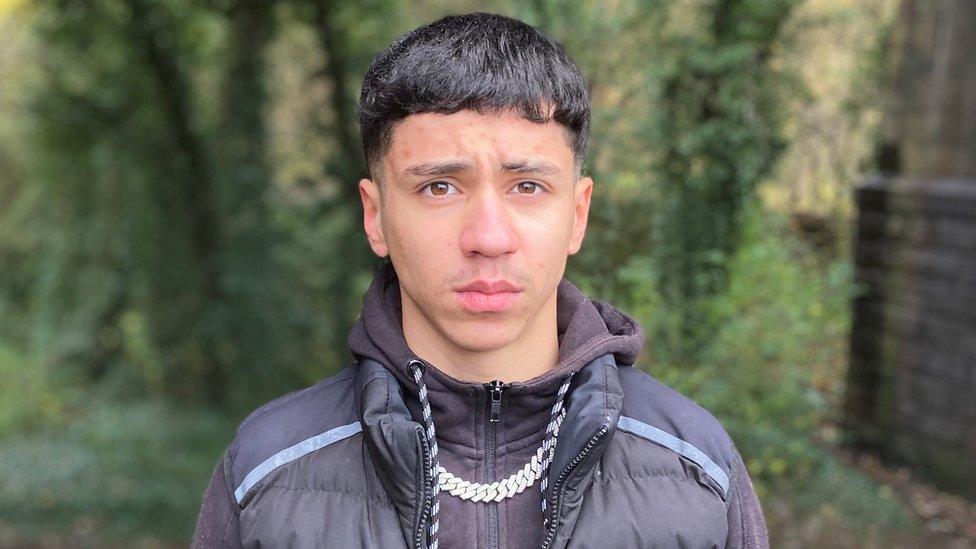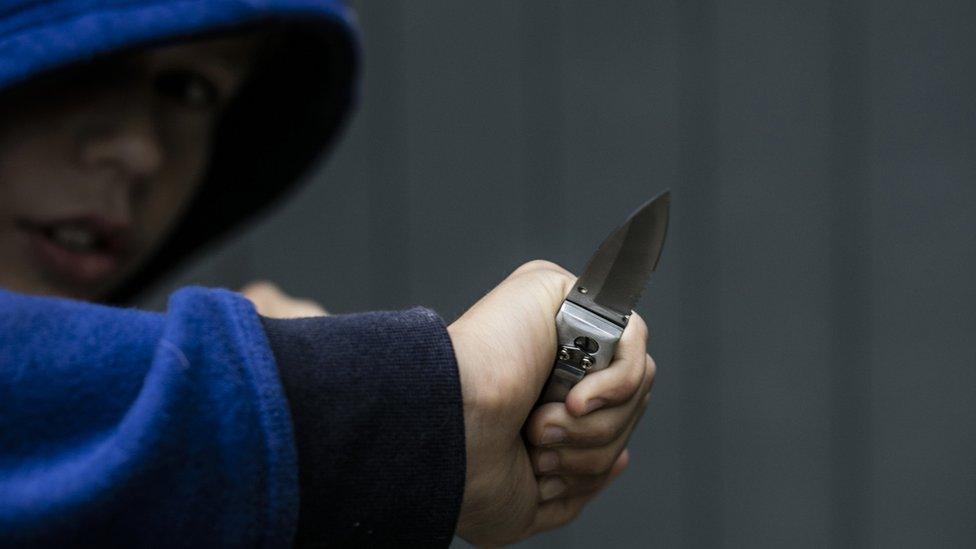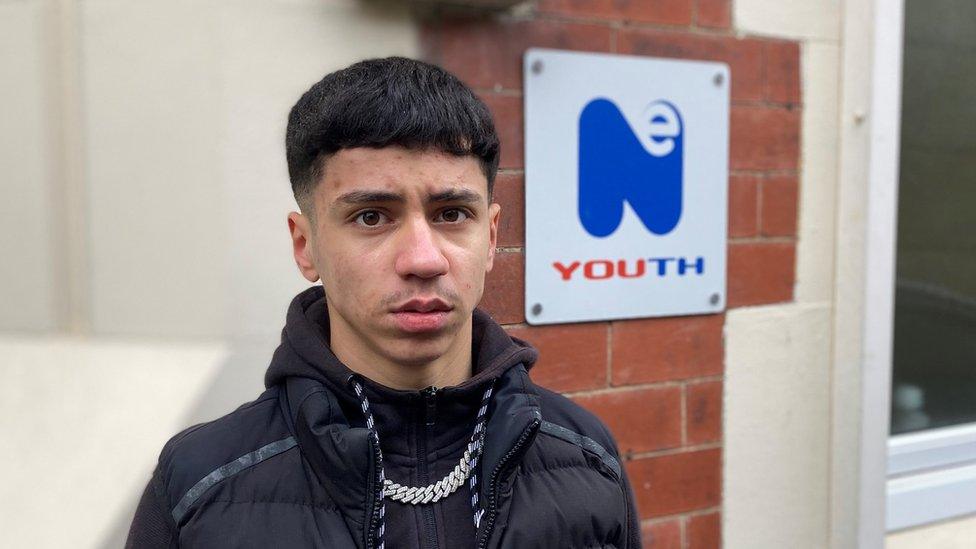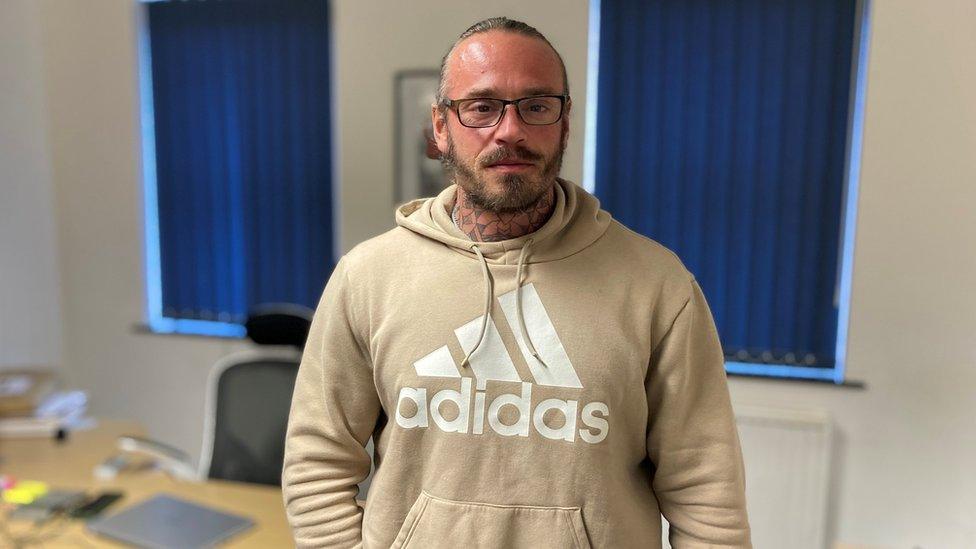Teenager stabbed in Newcastle speaks out on knife crime
- Published

Syrian refugee Yazan was stabbed in Newcastle
After 14-year-old Gordon Gault was killed with a machete, and with figures showing a rise in knife crime across the north-east of England, the BBC has been speaking to another teenage stabbing victim.
Yazan was attacked with a "kitchen knife" by a group in Newcastle in May last year and has been left with a scar above his ankle.
The teenager, originally from Syria, fled the war in his home country with his parents and arrived in the UK in 2016.
A scar on his eyebrow is from a bomb explosion.
Early life for him here wasn't easy either. He couldn't speak English and would get caught up in violence after school.
As he got older, friends he socialised with carried knives because of "beef" they had with other groups.
"Carrying knives is something that's happening a lot because of people thinking they're gangsters," Yazan says, adding: "But they're really not.
"Five years ago you didn't really see someone carrying a knife.
"And there wasn't really that much stabbings, especially in Newcastle. Now, it's getting worse and worse."


Yazan said he never carried a knife. But that didn't stop him being attacked.
"I walked out on the street and there was a group of lads with balaclavas and one of them had a knife," he recalls, adding: "I was thinking 'I am going to get stabbed'."
The attack was never reported to the police.
Yazan's injuries weren't life threatening but he knew he needed to "turn his life around".
He now gets mentor support from the charity NE Youth, which helps children caught up in knife crime.
He said as he moved into Year 11 at school, he started to "think differently".
He now uses boxing as a way of staying out of trouble and has dreams of turning professional.
"I want to be a boxer and make money," he says, adding: "You're thinking about your life."

Figures show a rise in North East knife crime (file photo)
Knife crime among children is rising in the north-east of England.
Three teenagers were stabbed to death in the region in as many months at the end of 2022 and the beginning of 2023. One was Gordon Gault, who died in hospital six days after being struck with a machete in Newcastle in November 2022.
"It's just a matter of time" before another child is killed in the region, Sgt Darren Williamson of Cleveland Police says.
The force has the second-highest knife crime rate in England, which is above London, according to the Office for National Statistics.
Figures obtained by the BBC through Freedom of Information requests to the region's police forces showed the number of children carrying knives on Teesside almost doubled in a year.
In 2021, the number was 51. It was 93 in 2022.

Yazan has been helped by the charity NE Youth
In 2019, 35 children on Teesside were the victims of violent knife crime, which includes stabbings and threats. In 2022 it was 118 - an increase of 237%.
Cleveland Police PC Ollie Cook said there's been "a massive increase in serious violence" and officers were seizing machetes and "Rambo-style knives" from teenagers more often.
"We found a young lad in Hartlepool with a makeshift sword down his top," he said.
Through the same FOI requests, the BBC found 700 children with a knife were stopped by police in the north-east of England between 2019 and 2022, an average of three a week.
In 2022, police stopped 198 children with a knife in the region, which was a 15% rise on the previous year.
The youngest child was six years old, while a number of others were aged 10 or under.
One organisation which supports children who carry knives is Edge North East.

Andy Smith founded Edge North East to help children move away from carrying knives
It works with teenagers who arm themselves with weapons while delivering drugs for criminal gangs.
"Any young person that comes through Edge's books carries a knife," according to founder Andy Smith.
He said: "We've had a few who came in who are lucky to be alive, literally by millimetres.
"They don't see the dangers of it. They are not scared of carrying a knife."
Andy says it often takes a child to be stabbed for them to realise they need to turn their life around.
"We're there to support them on a journey. It doesn't matter how long it takes," he added.
"There is no young person in this world that hasn't got hope. There is always hope."

Follow BBC Newcastle on Facebook, external, X (formerly Twitter), , externaland Instagram, external. Send your story ideas to northeastandcumbria@bbc.co.uk, external.